News & Announcements
- Details
- Written by Joshua Wachtel
 Mark Finnis, of Hull Centre for Restorative Practice, an IIRP affiliateAccording to the netnewsledger.com, on March 26, 2012, Thunder Bay, Ontario, Canada hosted:
Mark Finnis, of Hull Centre for Restorative Practice, an IIRP affiliateAccording to the netnewsledger.com, on March 26, 2012, Thunder Bay, Ontario, Canada hosted:
...a conference on restorative practices [that] brought together community leaders from education, enforcement, health, justice and youth services. Participants learned about what it means to be restorative and how to build a positive culture in our schools and communities. The conference was presented by the Restorative Practices Working Group in partnership with the Drug Awareness Committee of Thunder Bay, Thunder Bay District Health Unit, Thunder Bay Crime Prevention Council and Lakehead Public Schools.
- Details
- Written by Laura Mirsky
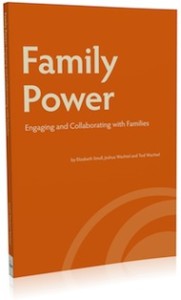 "Nothing about me without me." —Children and families involved in the FGC/FGDM process.
"Nothing about me without me." —Children and families involved in the FGC/FGDM process.
This new book, published by the IIRP, was written by Beth Smull, Joshua Wachtel and Ted Wachtel
Waves of change have weakened the influence of family in modern societies, yet family remains the most critical element in our social fabric. A new approach for working with families--"family group conferencing" (FGC) or "family group decision making" (FGDM)--seeks to strengthen this fabric by enlisting the collective power of families and their communities of care to address their own issues and solve their own problems. This paradigm has implications for myriad professionals, including social workers, police, court personnel, therapists, youth workers, day-care staff and educators.
- Details
- Written by Joshua Wachtel
 Jo Berry, from Lisa Rea interview at Restorative Justice OnlineJean Schmitz, director of IIRP Latin America, sent me a link to this piece he found at RJOnline (originally posted last May). It's a lengthy interview by Lisa Rea of Jo Berry, the daughter of Sir Anthony Berry, a member of parliament in the Thatcher government, who was one of five people killed by IRA bomber Patrick Magee in 1984. In 2000 she finally had the opportunity to meet with Magee. Berry begins:
Jo Berry, from Lisa Rea interview at Restorative Justice OnlineJean Schmitz, director of IIRP Latin America, sent me a link to this piece he found at RJOnline (originally posted last May). It's a lengthy interview by Lisa Rea of Jo Berry, the daughter of Sir Anthony Berry, a member of parliament in the Thatcher government, who was one of five people killed by IRA bomber Patrick Magee in 1984. In 2000 she finally had the opportunity to meet with Magee. Berry begins:
- Details
- Written by Laura Mirsky

This Saturday, April 1, 2012, will see a world-first event, bringing a corporate CEO face to face with the victims of their crimes against the Earth through restorative justice. The two fictional CEOs, Robin Bannerman and John Tench, who were found guilty of committing ecocide last year in the UK Supreme Court will be sentenced, in a process involving top experts, including Lawrence Kershen QC, chair of the Restorative Justice Council.
This is a trial run for a new offense of ecocide (much like genocide, but against the Earth and its resources) ahead of trying to get the UN to adopt the offense internationally. You can watch this event free online, Saturday April 1 at 10:30 a.m. U.K. time. More information here.
- Details
- Written by Joshua Wachtel
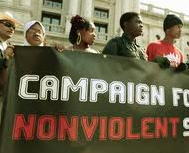 The Philadelphia Student Union produces On Blast, an audio podcast, and this week they posted some clips from an event sponsored by the Campaign for Nonviolent Schools on Martin Luther King Day (which I mentioned here back in January). IIRP's Steve Korr was a panelist and can be heard near the beginning of this clip talking about restorative practices as a leadership model. Listen to the entire recording, which is just a few minutes and contains some powerful voices about what students in schools need to transform the school environment.
The Philadelphia Student Union produces On Blast, an audio podcast, and this week they posted some clips from an event sponsored by the Campaign for Nonviolent Schools on Martin Luther King Day (which I mentioned here back in January). IIRP's Steve Korr was a panelist and can be heard near the beginning of this clip talking about restorative practices as a leadership model. Listen to the entire recording, which is just a few minutes and contains some powerful voices about what students in schools need to transform the school environment.
- Details
- Written by Joshua Wachtel
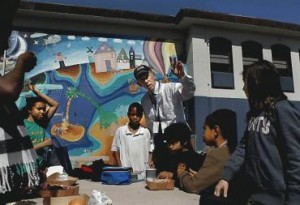 Photo by Michael Macor for the San Francisco Chronicle. Pictured here is Principal Jacobson of Rosa Parks Elementary with students. He wears a lanyard with IIRP's Restorative Questions card ready for use!Here's a lovely article by Jill Tucker at SFGate.com (home of the San Francisco Chronicle). San Francisco seems to be having a serious discussion in the print media about alternative discipline approaches in schools, in particular restorative practices.
Photo by Michael Macor for the San Francisco Chronicle. Pictured here is Principal Jacobson of Rosa Parks Elementary with students. He wears a lanyard with IIRP's Restorative Questions card ready for use!Here's a lovely article by Jill Tucker at SFGate.com (home of the San Francisco Chronicle). San Francisco seems to be having a serious discussion in the print media about alternative discipline approaches in schools, in particular restorative practices.
For two decades, Principal Paul Jacobsen was known as a no-nonsense, cut-to-the-chase, hard-nosed school administrator who didn't hesitate to dole out strict punishment when students broke the rules.
Then the San Francisco principal learned about something called the restorative justice approach.
- Details
- Written by Joshua Wachtel
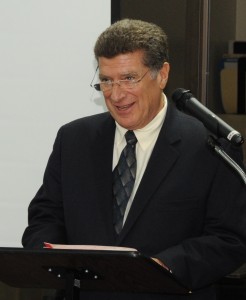 The Raven Foundation's online call-in radio program, Playing for Keeps on Talkshoe.com, has invited IIRP President Ted Wachtel to be a guest on its March 30 call-in radio/web program. The hosts are Adam Ericksen and award winning Peace Journalist Bob Koehler, who has written recently about restorative practices in the Chicago Tribune and Huffington Post. Below are all the details for listening from Playing for Keeps:
The Raven Foundation's online call-in radio program, Playing for Keeps on Talkshoe.com, has invited IIRP President Ted Wachtel to be a guest on its March 30 call-in radio/web program. The hosts are Adam Ericksen and award winning Peace Journalist Bob Koehler, who has written recently about restorative practices in the Chicago Tribune and Huffington Post. Below are all the details for listening from Playing for Keeps:
- Details
- Written by Joshua Wachtel
 Illustration of the CenterI've been saving this news for a rainy day, and here it is. This article, "Tribal Justice Center First of Its Kind" by Lisa Kopochinski for Correctional News last September discusses the process the Department of Indian Affairs used to work with Oglala Sioux tribal leaders to develop a new justice and public safety complex on the Pine Ridge Reservation. Architects and builders are working with the tribe to incorporate sustainable principles and technologies, and to adapt the complex to their cultural needs.
Illustration of the CenterI've been saving this news for a rainy day, and here it is. This article, "Tribal Justice Center First of Its Kind" by Lisa Kopochinski for Correctional News last September discusses the process the Department of Indian Affairs used to work with Oglala Sioux tribal leaders to develop a new justice and public safety complex on the Pine Ridge Reservation. Architects and builders are working with the tribe to incorporate sustainable principles and technologies, and to adapt the complex to their cultural needs.
The article notes:
For the first time, the new facility will house the entire public safety and justice services in a facility specifically designed by the tribe, for the tribe. A one-stop center for all justice services, the facility is designed to conform to cultural tenets of shared peace, restorative justice, harmony and service and will also contribute to the economy of the reservation — from the earliest stages through final move in. [emphasis added]
- Details
- Written by Joshua Wachtel
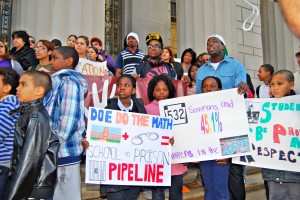 Photo by Emmanuel Yusuf, Huffington PostHere are two articles about on the ground responses by student groups calling for new approaches to school discipline that will not disproportionately harm minority students.
Photo by Emmanuel Yusuf, Huffington PostHere are two articles about on the ground responses by student groups calling for new approaches to school discipline that will not disproportionately harm minority students.
Youth United for Change in Philadelphia, Pennsylvania held a press conference March 12, to discuss their response to the Office of Civil Rights national data that "show huge racial disparities in suspension, expulsion, and school-based arrest rates at public schools." (see yesterday's blog post). From the YUC press release:
- Details
- Written by Joshua Wachtel
Here's a response a week ago to a report issued by the Department of Education stating that:
Minority students across America face harsher discipline, have less access to rigorous high school curricula, and are more often taught by lower-paid and less experienced teachers, according to the U.S. Department of Education's Office for Civil Rights (OCR).
The LA Times (Mar 10) noted that "the difference is especially stark for African American students, who make up 18% of the student population but 35% of first-time suspensions. "

Restorative Works Year in Review 2024 (PDF)
All our donors are acknowledged annually in Restorative Works.
